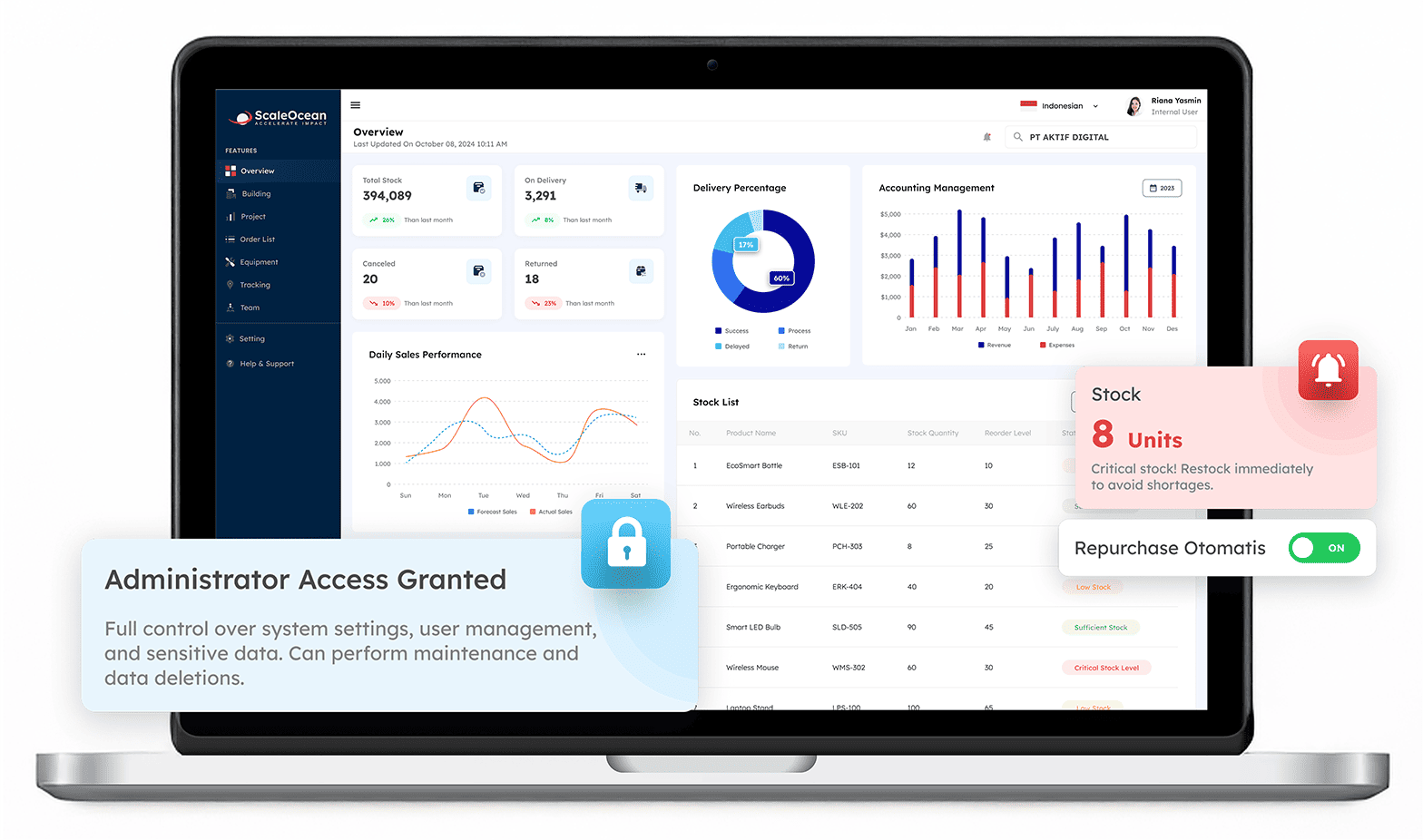Cloud ERP (Enterprise Resource Planning) systems have become essential for businesses in Singapore, a vibrant hub for global trade. With a strong emphasis on technological advancement and efficiency, companies in Singapore are increasingly turning to digital solutions to optimize their operations. A study by IMDA reveals that more than 84% of businesses in Singapore have embraced at least one digital technology to stay competitive in the rapidly evolving market.
In today’s competitive landscape, Cloud ERP helps businesses improve decision-making and swiftly respond to market changes. By taking advantage of its scalability and flexibility, companies can enhance operational efficiency and maintain a competitive advantage. This article explores the concept, benefits, and applications of Cloud ERP, highlighting its vital role in fostering digital transformation across various industries in Singapore.
1. What is Cloud ERP?
Cloud ERP refers to enterprise resource planning software that is hosted on cloud infrastructure and can be accessed through the internet. This eliminates the need for local hardware and maintenance, providing a scalable and cost-effective solution. By integrating essential functions such as finance, supply chain, HR, and customer management, it facilitates real-time updates and smooth collaboration among teams.
Thanks to its subscription-based model, Cloud ERP enables businesses to pay only for what they use, which enhances flexibility and efficiency. Centralized data sharing minimizes redundancies and boosts decision-making. This solution helps companies streamline workflows, adapt to rapidly changing environments, and achieve their strategic goals with increased agility.
2. Benefits of Cloud ERP

In the fast-paced world of business today, companies are constantly looking for ways to boost productivity while cutting costs and simplifying processes. Cloud ERP has become a transformative solution, providing a range of benefits for organizations in various sectors. By utilizing cloud technology and leveraging comprehensive ERP modules, businesses can streamline their operations, enhance decision-making, and maintain a competitive edge in a rapidly changing market.
The benefits of Cloud ERP go beyond just technological advancements; they empower businesses to optimize their resources and encourage innovation. From cost savings to improved scalability, these advantages create a solid foundation for success in the digital age. Here are some key benefits that highlight why Cloud ERP is a vital resource for modern businesses.
a. Cost Efficiency
Cloud ERP greatly lowers initial expenses related to hardware, installation, and maintenance. Companies can sidestep the hefty capital investments typically required for on-premises systems. This pay-as-you-go approach allows businesses to only pay for what they actually use, making it a smart financial choice for small and medium-sized enterprises as well as startups.
Moreover, online ERP removes unexpected costs tied to system upgrades or downtime. With fixed monthly fees, businesses can better manage their budgets while directing resources toward their core operations. The top cloud ERP solutions deliver value without sacrificing functionality or performance.
b. Accessibility and Mobility
Cloud ERP enables businesses to access their systems and data from anywhere, at any time. Employees can collaborate effortlessly, no matter their location, which is particularly beneficial for organizations with remote teams or multiple offices. The flexibility of cloud-based ERP boosts productivity and ensures uninterrupted operations.
This mobility also facilitates real-time decision-making. For instance, managers can check financial reports, monitor inventory, or approve transactions while on the move. Such features are essential for businesses in fast-paced environments where quick responses are critical.
c. Scalability
Cloud ERP is designed to grow alongside your business. Whether you’re expanding your operations, entering new markets, or adapting to seasonal fluctuations, the system can easily adjust resources as needed. In contrast to on-premises systems, which often require hefty investments for expansion, cloud-based ERP solutions can adapt to your changing needs without the need for additional infrastructure.
This scalability allows businesses to seize opportunities and tackle challenges promptly. From small startups to large multinational corporations, online ERP provides the flexibility necessary to succeed in competitive environments.
d. Automatic Updates
With cloud-integrated ERP, businesses can always access the latest features and updates without needing to intervene manually. Providers take care of upgrades and security patches, enabling companies to concentrate on their core operations rather than IT upkeep. This ongoing improvement keeps systems running smoothly and aligned with the evolving demands of the business landscape.
By remaining current, companies gain access to new functionalities, enhanced security measures, and better performance. This proactive strategy minimizes downtime and helps businesses stay competitive in a fast-paced technological environment.
e. Data Security
Data security is a primary concern for Cloud ERP providers, who utilize advanced encryption, multi-factor authentication, and regular backups to protect sensitive information. Businesses can have confidence that their data is secure from breaches or unauthorized access.
Additionally, compliance with international data protection regulations provides an extra layer of reassurance. For companies in regulated industries, adopting Cloud ERP ensures they meet necessary standards while maintaining operational integrity.
3. Cloud ERP vs. On-Premises ERP
When choosing an ERP solution, businesses must weigh the pros and cons of both Cloud ERP and on-premises ERP systems. Although both offer robust tools for managing operations, they vary significantly in terms of deployment methods, costs, and flexibility. In the following sections, we will explore the key differences between Cloud ERP and on-premises ERP, focusing on aspects such as data storage, implementation costs, scalability, and security.
As reported by Business Research Insights, the global ERP software market is expected to reach USD 105.4 billion by 2029, fueled by the rising adoption of cloud-based solutions across various industries. This highlights the increasing preference for Cloud ERP due to its scalability and efficiency, while on-premises ERP continues to be a viable option for businesses that require more control and customization.
a. Data Storage
On-premises ERP systems keep data on local servers, which means they need dedicated IT infrastructure and ongoing maintenance. This setup requires considerable resources for hardware upgrades, power backups, and physical security measures.
In contrast, Cloud ERP utilizes cloud-based storage, enabling remote access from anywhere with an internet connection and offering improved disaster recovery options. This reduces dependence on physical hardware, lowering the risks tied to server failures or natural disasters.
b. Implementation Costs
Cloud ERP typically has lower initial costs than on-premises systems, which demand significant investments in hardware, installation, and setup. Moreover, Cloud ERP removes the necessity for frequent hardware upgrades, further cutting down expenses over time.
Operational costs for maintenance, system updates, and troubleshooting are also reduced with Cloud ERP since providers take care of these responsibilities. This makes it an attractive option for businesses aiming to manage budgets while maintaining efficiency.
c. Scalability and Flexibility
Cloud ERP outperforms on-premises systems with its capacity to adjust resources dynamically according to business needs. Companies that experience rapid growth or seasonal changes can easily scale their operations without major IT infrastructure modifications.
The flexibility of ERP cloud services ensures that businesses can maintain optimal performance during periods of expansion or market shifts. This adaptability makes Cloud ERP an excellent choice for growing companies and those in fluctuating markets.
d. Data Security
Both systems emphasize the importance of data security, but Cloud ERP providers go a step further by incorporating advanced measures like encrypted data transfers, multi-layered authentication, and regular vulnerability testing. These features give businesses strong protection against cyber threats.
In contrast, on-premises systems depend on internal IT teams, which might struggle with resource limitations when tackling complex security issues. Consequently, Cloud ERP tends to provide a more dependable and thorough method for protecting sensitive information.
Also Read: What is ERP System? A Detailed Description
4. Key Components of Cloud ERP

Cloud ERP systems provide a variety of modules that enhance business operations and facilitate improved decision-making. These components work together smoothly, allowing organizations to oversee various functions from a single platform. By utilizing these tools, companies can increase efficiency, reduce expenses, and align with their strategic objectives.
According to ERPnews, essential Cloud ERP components consist of HR for handling employee life cycles, CRM for enhancing customer interactions, and Business Intelligence for gaining data-driven insights. These modules help businesses remain agile and competitive in an ever-changing market.
a. Financial Management
This module simplifies accounting, budgeting, and financial reporting, giving businesses clear insights into their financial status. It ensures compliance and makes tax reporting easier, helping companies maintain financial clarity.
Cloud ERP financial tools provide real-time updates, enabling businesses to monitor expenses and revenues as they happen. These features empower managers to make well-informed financial choices and respond swiftly to changing market dynamics.
b. Human Resource Management (HRM)
Cloud ERP consolidates employee records, payroll, and recruitment processes, leading to improved workforce management. Automation reduces administrative tasks and boosts employee engagement.
With data-driven insights, HRM modules can spot workforce trends and anticipate future hiring needs. This encourages a proactive approach to talent management, assisting companies in retaining top talent and sustaining a productive workforce.
c. Supply Chain Management
Manage inventory, procurement, and logistics effectively with Cloud ERP’s supply chain modules. These tools enhance workflows and cut costs while ensuring timely deliveries. Integrated supply chain features allow businesses to accurately forecast demand, reducing the risk of stock shortages or surplus inventory. By optimizing procurement and distribution, companies can achieve better coordination with suppliers and vendors.
d. Manufacturing and Production
Cloud ERP covers every aspect of manufacturing, from planning to quality control. By tracking production metrics in real-time, businesses can boost productivity and reduce waste. Advanced scheduling tools enable manufacturers to synchronize production timelines with customer demands, leading to better order fulfillment rates. Moreover, real-time monitoring helps maintain quality standards throughout the production process.
e. Customer Relationship Management (CRM)
CRM modules assist businesses in fostering stronger customer relationships by managing interactions and analyzing behaviors. With integrated tools, companies can provide personalized experiences that enhance customer loyalty. By utilizing data insights, businesses can develop targeted marketing campaigns and uncover new sales opportunities. The CRM module also ensures a smooth customer experience by integrating with support and service systems.
5. Types of Cloud ERP
As businesses increasingly embrace technology-driven strategies, choosing the right type of Cloud ERP is crucial. Each organization has its own operational needs, and Cloud ERP systems provide various deployment models to meet these diverse requirements. From cost-effectiveness to customization, these types of Cloud ERP offer solutions designed to tackle specific challenges and objectives. Here are the main types of Cloud ERP:
a. Public Cloud ERP
Public Cloud ERP runs on a shared infrastructure managed by service providers, making it a budget-friendly option for businesses. This model allows multiple organizations to utilize shared resources while ensuring data separation and security.
Public Cloud ERP is particularly suitable for startups and small businesses that need quick implementation and low initial investment. The pay-as-you-go structure offers flexibility, allowing companies to adjust resources as necessary. With regular updates from the vendor, businesses can keep up with technological advancements without incurring extra costs or effort.
b. Private Cloud ERP
Private Cloud ERP provides a dedicated platform specifically designed for a single organization, offering maximum control and customization. This deployment model ensures that the system is perfectly aligned with a company’s unique needs and workflows.
Organizations with stringent security requirements or specialized operational processes gain from Private Cloud ERP’s enhanced control over their infrastructure. It allows for deeper integration with existing systems and supports complex configurations. While it may be more expensive than public options, the investment guarantees a tailored solution that effectively addresses specific business challenges.
c. Hybrid Cloud ERP
Hybrid Cloud ERP merges the advantages of both public and private clouds, providing a flexible and cost-efficient solution. Companies can utilize public cloud services for everyday operations while keeping private cloud capabilities for sensitive or critical processes.
This model facilitates smooth integration, allowing organizations to gradually shift from traditional systems.
Hybrid Cloud ERP is especially advantageous for businesses with varying demands, as it strikes a balance between cost-effectiveness and resource scalability. Additionally, the hybrid approach minimizes downtime and guarantees business continuity during migrations or upgrades.
6. Why Choose Cloud ERP?
Cloud ERP has revolutionized business operations by offering a range of advantages over traditional systems. Its adaptability, affordability, and robust features make it an attractive choice for organizations of any size. By centralizing information and streamlining workflows, Cloud ERP allows businesses to quickly respond to changing market dynamics. For those interested in its capabilities, an online ERP demo can offer valuable insights into its functionality and how it can meet specific business requirements. Here are some important reasons to consider Cloud ERP:
a. Cost Efficiency
Cloud ERP helps lower operational costs by removing the need for costly hardware and IT upkeep. This allows companies to use their resources more wisely and invest the savings into growth opportunities.
With subscription-based pricing, businesses can also predict their expenses better, aiding in financial planning. Additionally, the savings extend to reduced energy use and fewer IT staff requirements. Over time, these savings can be reinvested into innovation and expanding into new markets.
b. Enhanced Mobility
Cloud ERP allows employees to access essential business applications and data from any location, boosting productivity and collaboration. This is especially beneficial for remote teams or companies with multiple sites.
Mobility provides decision-makers with real-time insights, no matter where they are. It enhances communication across different departments and locations, eliminating geographical barriers. Consequently, teams can tackle challenges and seize opportunities more efficiently.
c. Simplified Updates
With Cloud ERP, businesses benefit from always having the latest technology without the need for manual updates. Vendors handle upgrades smoothly, reducing disruptions and ensuring system reliability.
This ongoing enhancement keeps businesses competitive and in tune with industry developments. Automatic updates also help maintain compliance with the latest security standards, minimizing vulnerabilities. By staying up-to-date, companies can concentrate on their main activities without the concern of outdated systems.
d. Scalability
As businesses expand, Cloud ERP seamlessly adjusts to handle greater workloads and more users. Whether entering new markets or launching new products, this flexibility supports growth without requiring expensive infrastructure upgrades.
Scalability also allows companies to manage seasonal demand changes without overextending their resources. This adaptability ensures that businesses stay nimble and ready for future opportunities or challenges.
Also Read: What Are The Main Characteristics of ERP System?
7. When Should You Move Your Business to Cloud ERP?

Knowing when to migrate to Cloud ERP is vital for a seamless and effective implementation. Delaying the transition can impede growth, while jumping in too soon may overextend resources.
Identifying key indicators is essential for businesses to determine the right moment for the switch. Timing the migration correctly allows for better resource management and reduces the risk of disruptions during the process. Here are some typical situations that signal the need to transition to Cloud ERP:
a. Rapid Business Growth
Transitioning to Cloud ERP is crucial during times of rapid business growth when traditional systems struggle to keep pace. The adaptability of Cloud ERP enables businesses to swiftly add new users, incorporate additional features, and manage larger volumes of data.
This scalability guarantees smooth operations without the need for substantial infrastructure investments. Furthermore, Cloud ERP facilitates expansion into new markets by offering real-time data access across different locations. With these advantages, companies can sustain their competitive edge and efficiently meet increasing market demands.
b. Outdated Systems
When traditional enterprise systems fail to meet current business requirements, migrating to a cloud-based solution becomes a strategic choice. Traditional platforms frequently lack the flexibility to adapt to changing operating demands, resulting in inefficiencies and excessive maintenance costs.
Cloud-based platforms offer expanded features like as automation, real-time information, and enhanced integrations, all in line with modern operational requirements. Furthermore, obsolete systems may pose security problems, which cloud solutions may alleviate with strong safeguards. Transitioning guarantees that your firm remains relevant and competitive in a technologically driven environment.
c. Real-Time Data Needs
Adopting cloud-based platforms is critical for firms that want immediate access to information in order to make quick decisions. Real-time analytics enable managers to monitor important performance metrics and respond quickly to market changes. These platforms provide consolidated data access, which minimizes the need for manual data collection and processing.
This feature improves cross-departmental collaboration and enables informed decision-making. Companies that use real-time analytics may improve workflows, increase customer satisfaction, and grasp opportunities faster than their competition.
d. Compliance Requirements
As regulatory environments become more stringent, cloud-based enterprise solutions enable firms to manage compliance smoothly. These platforms provide advanced reporting capabilities and secure data management in accordance with legal norms. Built-in compliance tools reduce the risk of penalties while increasing transparency with stakeholders.
Providers often update their software to match regulatory changes, which reduces the administrative burden on organizations. Companies that implement these solutions may demonstrate accountability while protecting sensitive data, resulting in increased trust from investors and clients.
8. Top Cloud ERP Providers
Choosing the right Cloud ERP provider is essential for the success of your business operations. Each provider has its own unique features, strengths, and specializations that cater to different industries and business sizes. By understanding these options, businesses can better align their ERP selection with their specific operational and strategic goals.
a. ScaleOcean

ScaleOcean is a major Cloud ERP supplier in Singapore, helping businesses streamline and consolidate their essential processes. Its flexible platform responds to the specific needs of Singapore’s dynamic market, providing efficient processes and long-term success. ScaleOcean has a proven track record of empowering enterprises to achieve more efficiency and maintain a competitive edge by providing personalized solutions that solve unique operational demands.
Learn how ScaleOcean’s unique ERP solutions may help your business optimize procedures, stimulate innovation, and drive long-term success. Request a free demo today to see ScaleOcean’s full potential for your company, and here is the key Features of ScaleOcean’s ERP:
- Unlimited Users Without Extra Costs, Experience complete user access without any extra fees, allowing for unrestricted growth in your business. This flexibility means you can scale your operations without the stress of user limitations.
- All-in-One Solution, Gain access to over 200 customized modules and more than 1,000 specific features tailored to your business needs. ScaleOcean ensures that all your business functions are integrated seamlessly within a single platform.
- Cost-Effective Pricing, Enjoy flat-rate pricing with no hidden fees, making it perfect for midsize to enterprise-level businesses. This clarity helps you manage your budget effectively, avoiding any unexpected costs.
- Customizable Solutions, Benefit from advanced configurations and personalized dashboards that align with your company’s workflows. This customization allows businesses to enhance efficiency by tailoring the ERP to their specific operational requirements.
- Branch Integration, Effortlessly connect multiple subsidiaries or branches on one platform. This feature offers a cohesive view of operations, facilitating improved decision-making across different locations.
- Automation for Business Operations, Implement comprehensive automation to streamline workflows and boost operational efficiency. Automated processes free up essential resources, enabling teams to concentrate on strategic priorities.
- After-Sales Support, A dedicated professional team is available to provide free, interactive, and prompt support after implementation. This ensures that businesses can quickly address issues and maintain smooth operations.
b. SAP
SAP offers ERP systems that support a wide range of corporate tasks, including financial management and supply chain processes. These systems comprise modules tailored to the specific requirements of diverse sectors. SAP’s solutions, which include features such as analytics and process automation, aim to help organizations manage their operations more successfully.
c. NetSuite
NetSuite provides integrated ERP solutions that merge finance, customer management, and inventory control. It enables real-time data sharing across departments, enhancing synchronization and teamwork. The system’s customizable features assist organizations in streamlining their decision-making processes.
d. Acumatica
Acumatica focuses on ERP solutions for small and medium-sized businesses, offering tools that address a variety of operational needs. Its modular structure allows companies to adopt the features that are most pertinent to their operations. The system is especially effective in simplifying workflows and ensuring efficiency.
e. Microsoft Dynamics 365
Microsoft Dynamics 365 integrates essential ERP functions with customer relationship management capabilities within a single platform. Its compatibility with popular Microsoft tools boosts productivity and facilitates data flow across departments. The system is crafted to effectively support a range of business processes in a cohesive manner.
9. The Future of Cloud ERP in Singapore
Singapore is recognized as a leading global business hub, at the forefront of adopting innovative technologies like Cloud ERP. Thanks to initiatives such as Singapore business grants, companies are encouraged to implement advanced solutions that boost efficiency and flexibility. Cloud ERP is constantly evolving, providing enhanced functionalities and capabilities.
The future of Cloud ERP in Singapore will be shaped by technological advancements, new features, and the nation’s ongoing digital transformation journey. Let’s explore how these factors will influence the next phase of Cloud ERP adoption.
Also Read: 15 Recommended ERP Software Singapore 2025
a. Technological Trends
The rise of AI and IoT promises to transform the capabilities of business resource planning tools. AI-powered automation will improve decision-making by giving predicted insights and streamlining routine processes. Meanwhile, IoT integration will enable real-time data capture from connected devices, hence improving supply chain performance and asset tracking.
These developments will allow businesses to respond more quickly to market shifts and improve their workflows. As these advances progress, ERP platforms will become smarter and more adaptable to shifting business landscapes.
b. Innovative Features
Next-generation ERP software will prioritize technologies such as predictive analytics and machine learning to improve usability. Predictive analytics will allow businesses to better anticipate market trends and make data-driven decisions with greater confidence.
Machine learning will do complex operations with minimum human intervention, decreasing errors and speeding procedures. The user interfaces will be enhanced for simplicity and straightforward navigation, making ERP tools more accessible. These improvements will enable organizations to get the most out of their systems while remaining competitive.
c. Digital Transformation
ERP platforms play an important role in Singapore’s efforts for industry-wide digital transformation. As firms progressively digitize their activities, these solutions provide an integrated solution for successful operations management. This synergy reinforces Singapore’s objective of a strong digital economy and promotes innovation.
Businesses that implement modern ERP solutions may remain nimble, meet regulatory standards, and leverage cutting-edge technologies. ERP platforms will continue to play an important role in Singapore’s march to complete digital integration.
10. Conclusion
Cloud ERP is essential for boosting business efficiency and competitiveness, particularly in a fast-changing market like Singapore. By bringing together various functions into a single platform, it allows for real-time data access, better decision-making, and more streamlined operations. Companies that implement Cloud ERP enjoy the flexibility and scalability necessary to succeed in today’s rapid digital landscape.
For businesses considering Cloud ERP, choosing a dependable and adaptable solution is vital. ScaleOcean provides a customized Cloud ERP platform that caters to a wide range of business requirements while ensuring smooth scalability. Start optimizing your operations and gaining a competitive edge by trying ScaleOcean’s free demo today to see how it can enhance your business processes.



 Click to Chat!
Click to Chat!